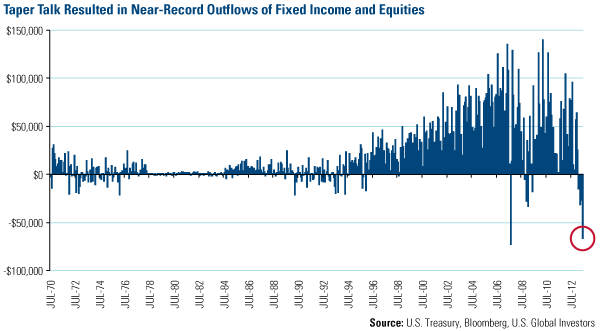The Economy and Bond Market Radar (August 19, 2013)
Treasury yields moved sharply higher this week as both economic data and the Fed’s resolve appear strong enough to follow through with reducing the QE program, commonly known as tapering.
The selling of U.S. fixed income and equities was at an extreme in June, with the number of outflows not seen since August 2007. According to the U.S. Treasury, $66.9 billion of long-term U.S. securities were sold, including $40.8 billion in Treasury bonds. This is the “highest monthly sell-off [in Treasuries] on record,” according to the Financial Times. China and Japan led foreign investors in the sell-off after the Fed began talks on tapering its monetary stimulus later this year. This could be the “shot across the bow” that the “great rotation” from fixed income and into equities may be beginning.
Strengths
- Retail sales, excluding autos, rose 0.5 percent in July, which was the fastest pace since December.
- Weekly initial jobless claims hit the lowest level since October 2007.
- The eurozone grew 0.3 percent in the second quarter, which ended a streak of six consecutive quarters of contraction.
Weaknesses
- Treasury yields headed higher as fears of Fed tapering intensified.
- Japan’s second quarter GDP fell well short of the forecast, rising only 2.6 percent.
- Wal-Mart reported disappointing results and outlook, causing some to question the strength of the economic recovery.
Opportunity
- Despite recent conflicting commentary, the Fed continues to remain committed to an accommodative policy.
- Key global central bankers are still in easing mode such as the European Central Bank (ECB), Bank of England and the Bank of Japan.
- The recent sell-off in bonds is likely an opportunity as higher yields will act as a brake on the economy and potentially become self-fulfilling, thus postponing Fed tapering.
Threat
- Inflation in some corners of the globe is getting the attention of policy makers and may be an early indicator for the rest of the world.
- Trade and/or currency wars cannot be ruled out which may cause unintended consequences and volatility in the financial markets.
- The recent bond market sell-off may be a “shot across the bow” as the markets reassess the changing macro dynamics.















